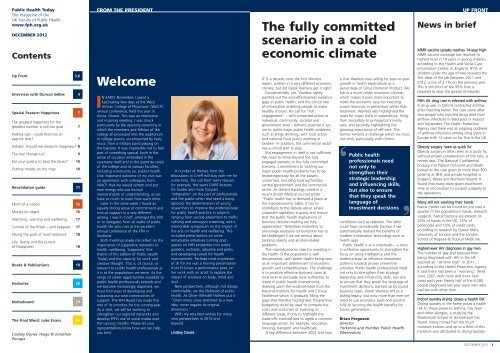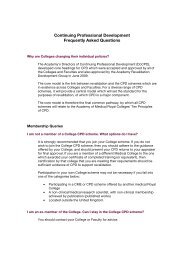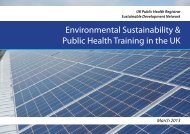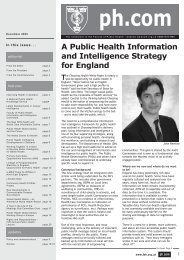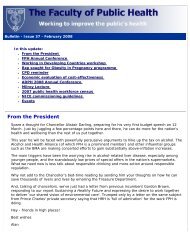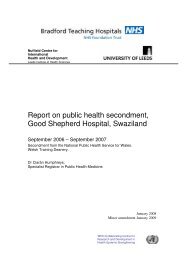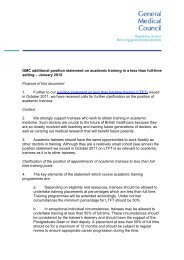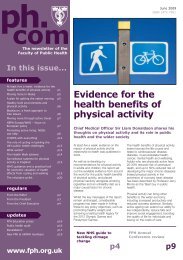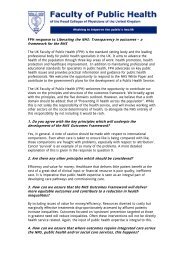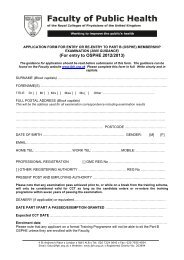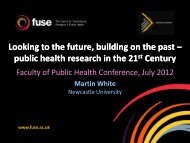December Edition â Happiness - UK Faculty of Public Health
December Edition â Happiness - UK Faculty of Public Health
December Edition â Happiness - UK Faculty of Public Health
- No tags were found...
You also want an ePaper? Increase the reach of your titles
YUMPU automatically turns print PDFs into web optimized ePapers that Google loves.
<strong>Public</strong> <strong>Health</strong> TodayThe magazine <strong>of</strong> the<strong>UK</strong> <strong>Faculty</strong> <strong>of</strong> <strong>Public</strong> <strong>Health</strong>www.fph.org.ukDECEMBER 2012ContentsUp Front 3,6Interview with Duncan Selbie 4Special Feature: <strong>Happiness</strong> 7The greatest happiness for thegreatest number is still our goal 7Feeling sad – could there be anapp for that? 7Debate: Should we measure happiness? 8The real Shangri-La? 9Eat your greens to beat the blues? 10Putting moods on the map 10Revalidation guide 11Mirth <strong>of</strong> a nation 15Money no object 16Watching, wanting and wellbeing 17Survival <strong>of</strong> the fittest – and happiest 17Taking the path <strong>of</strong> most resilience 18Life, liberty and the pursuit<strong>of</strong> Mappiness 18Books & <strong>Public</strong>ations 19Endnotes 20Noticeboard 23The Final Word: Jules Evans 24Lindsey Davies image © JonathanPerugiaFROM THE PRESIDENTWelcomeIN EARLY November, I spent afascinating few days at the WestAfrican College <strong>of</strong> Physicians’ (WACP)annual conference, held this year inAccra, Ghana. This was an impressiveand inspiring meeting. I was struckparticularly by the opening ceremony inwhich the members and fellows <strong>of</strong> thecollege all processed into the auditoriumin college gowns, accompanied by livelymusic from a military band playing onthe balcony. It was impossible not to feelpart <strong>of</strong> something special: both in thesense <strong>of</strong> occasion embodied in theceremony itself and in the esprit de corps<strong>of</strong> the college and its various faculties,including community (ie. public) health.One important outcome <strong>of</strong> my visit wasan agreement with colleagues fromWACP that we would refresh and putnew energy into our mutualmemorandum <strong>of</strong> understanding, as wehave so much to learn from each other.Later in the same week I found anequally strong sense <strong>of</strong> commitment andmutual support in a very differentsetting. I was in Crieff, amongst the 300or so delegates from all walks <strong>of</strong> publichealth life who met at the excellentannual conference <strong>of</strong> the FPH inScotland.Both meetings made me reflect on theimportance <strong>of</strong> supportive networks tohealth, wellbeing, ‘happiness’ (thetheme <strong>of</strong> this edition <strong>of</strong> <strong>Public</strong> <strong>Health</strong>Today) and the capacity for work andcreative thought. This is, <strong>of</strong> course, asrelevant to public health pr<strong>of</strong>essionals asit is to the populations we serve. As therange <strong>of</strong> career opportunities available topublic health pr<strong>of</strong>essionals extends andwe become increasingly dispersed, wemust find ways <strong>of</strong> developing andsustaining our own communities <strong>of</strong>support. The FPH Board has made thisone <strong>of</strong> its priorities for the coming year.As a start, we will be working tostrengthen our regional networks anddevelop FPH’s use <strong>of</strong> social media overthe coming months. Please let yourrepresentatives know how we can helpyou best.A number <strong>of</strong> themes from thediscussions in Crieff will stay with me forsome time. The call from Gerry Hassan,for example, this year’s DARE lecturer,for louder and more focused‘indignation’ on the part <strong>of</strong> pr<strong>of</strong>essionalsand the public when real need is beingignored; the determination <strong>of</strong> youngresearchers to improve the evidence-basefor public health practice in subjectsranging from suicide prevention to trafficcalming and aneurysm screening; and amemorable symposium on the impact <strong>of</strong>the arts on health and wellbeing. Thisincluded presentations on someremarkable initiatives turning openspaces on NHS properties into publicgardens, orchards, arboreta and parks,and developing canals for healthimprovement. Perhaps most impressive<strong>of</strong> all for me was a moving presentationfrom El Gruer, a performance poet, onher work with an artist to explore theimpact <strong>of</strong> anorexia on body, mind andsoul.New perspectives, although not alwayscomfortable, are the lifeblood <strong>of</strong> publichealth. As Oliver Wendell Holmes put it:“One’s mind, once stretched to a newidea, never regains its originaldimension.”With my very best wishes for manynew perspectives in 2013 andbeyond.Lindsey DaviesThe fully committedscenario in a coldeconomic climateIT IS a decade since the first Wanlessreport, written in a very different economicclimate, but did Derek Wanless get it right?Fundamentally, yes. Wanless rightlypointed out the cost-effectiveness evidencegaps in public health, and the critical role<strong>of</strong> information enabling people to makehealthy choices. His call for “fullengagement” – with concerted action atindividual, community, societal andgovernment level – remains essential if weare to tackle major public health problems,such as binge drinking, with local actionand national fiscal policy working intandem. In addition, the commercial sectorhas a critical part to play.But engagement in itself is not sufficient.We need to move beyond the fullyengaged scenario to the fully committedscenario. Commitment to tackling ourmajor public health problems has to betested rigorously for all the playersconcerned, including local authorities,central government and the commercialsector. As Gerard Hastings noted in arecent British Medical Journal article:“<strong>Public</strong> health has to demand a place atthe macroeconomic table; it has tocontribute to the debate about wherecorporate capitalism is going and ensurethat the public health implications <strong>of</strong>business decision-making are fullyappreciated.” Relentless marketing toencourage excessive consumption has tobe challenged if we are serious abouttackling obesity and alcohol-relatedproblems.The macroeconomic case for investing inthe health <strong>of</strong> the population is welldocumented, with better health being seenas an important determinant <strong>of</strong> economicgrowth and competitiveness. The challengeis to produce effective business cases atlocal level to persuade local authorities toinvest in public health interventions,drawing upon the evidence-base from theNational Institute for <strong>Health</strong> and ClinicalExcellence which is gradually filling thegaps that Wanless highlighted. Programmebudgeting could be used to compare thecosts and outcomes <strong>of</strong> investing indifferent areas, if only to highlight thetrade-<strong>of</strong>fs involved and to agree a commonlanguage across, for example, education,housing, transport and healthcare.A key difference between 2002 and nowis that Wanless was calling for year-on-yeargrowth in health expenditure as apercentage <strong>of</strong> Gross Domestic Product. Welive in a much colder economic climate,which makes it even more important tomake the economic case for investingscarce resources in prevention rather thantreatment. Wanless also highlighted theneed for major shifts in expenditure, firstlyfrom secondary to primary/communitycare, and secondly highlighting thegrowing importance <strong>of</strong> self-care. Theformer remains a challenge which we mustnot shirk, particularly with chronic‘<strong>Public</strong> healthpr<strong>of</strong>essionals neednot only tostrengthen theirstrategic leadershipand influencing skills,but also to ensurethat they speak thelanguage <strong>of</strong>investment decisionsconditions such as diabetes. The lattercould have considerable traction if wesystematically realised the benefits <strong>of</strong>modern information technology such ashealth apps.<strong>Public</strong> health is at a crossroads – a oncein-a-lifetimeopportunity to strengthen thefocus on using intelligence and theevidence-base to influence investmentpatterns towards proven preventiveactivities. <strong>Public</strong> health pr<strong>of</strong>essionals neednot only to strengthen their strategicleadership and influencing skills, but alsoto ensure that they speak the language <strong>of</strong>investment decisions, backed up by soundbusiness cases. Derek Wanless left us alasting legacy; but now more than ever weneed to use economic tools and commitfully to securing the health benefits forfuture generations.Brian FergusonDirectorYorkshire and Humber <strong>Public</strong> <strong>Health</strong>Observatory‘UP FRONTNews in briefMMR vaccine uptake reaches 14-year highMMR vaccine coverage has reached itshighest level in 14 years in young children,according to the <strong>Health</strong> and Social CareInformation Centre. In England, 91% <strong>of</strong>children under the age <strong>of</strong> two received thefirst dose <strong>of</strong> the jab between 2011 and2012, a rise <strong>of</strong> 2.1% on the previous year.This is still short <strong>of</strong> the 95% that isrequired to stop the spread <strong>of</strong> measles.Fifth <strong>UK</strong> drug user is infected with anthraxA drug user in Oxford contracted anthraxafter injecting heroin.The case came aftertwo people who injected drugs died fromanthrax infections in Blackpool in Augustand September. The <strong>Health</strong> ProtectionAgency said there was an ongoing outbreak<strong>of</strong> anthrax infections among drug users inEurope with 12 cases so far, five in the <strong>UK</strong>.Obesity surgery 'seen as quick fix'Obesity surgery is <strong>of</strong>ten seen as a quick fix,without proper consideration <strong>of</strong> the risks, areview says. The National ConfidentialEnquiry into Patient Outcome and Deathlooked at the care given to more than 300patients at NHS and private hospitals inEngland, Wales and Northern Ireland. Itfound that many were given insufficienttime or information to consent properly tothe operations.Many still not washing their handsFaecal matter can be found on just over aquarter <strong>of</strong> the population’s hands, researchsuggests. Faecal bacteria are present on26% <strong>of</strong> hands in the <strong>UK</strong>, 14% <strong>of</strong>banknotes and 10% <strong>of</strong> credit cards,according to research by Queen Mary,University <strong>of</strong> London and the LondonSchool <strong>of</strong> Hygiene & Tropical Medicine.Highest-ever HIV diagnoses in gay menThe number <strong>of</strong> gay and bisexual menbeing diagnosed with HIV in the <strong>UK</strong>reached an “all-time high” in 2011,according to the <strong>Health</strong> Protection Agency.It said there had been a “worrying” trendsince 2007, with more and more newcases each year. Nearly half <strong>of</strong> the 6,280people diagnosed last year were men whohad sex with other men.Indoor laundry drying ‘poses a health risk’Drying laundry in the home poses a healthrisk to those prone to asthma, hay feverand other allergies, a study by theMackintosh School <strong>of</strong> Architecture hasfound. Many homes had too muchmoisture indoors and up to a third <strong>of</strong> thismoisture was attributed to drying laundry.DECEMBER 2012 3


